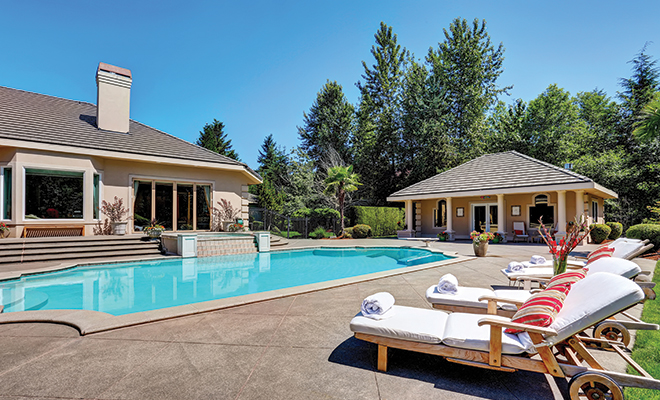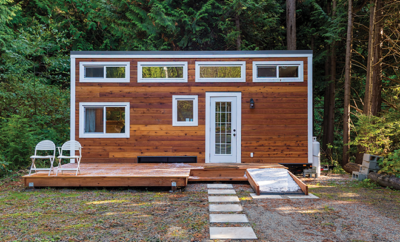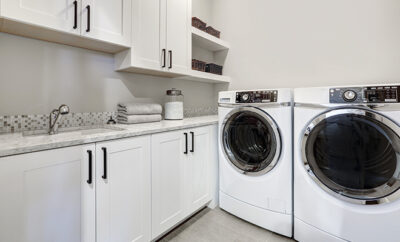
A Pool: Your Backyard Oasis
Whether you’re shopping for a new home and want a swimming pool as part of the deal or are thinking of filling your empty yard with a pool, it’s important to understand the pros and cons
of pool ownership before jumping in (pardon the pun!).
Having a pool can turn your home into the cool house on the block, especially if you have children. A pool will improve any party or backyard barbecue. If you use swimming for fitness, a pool can save you the cost of a gym membership. A built-in pool can also be an asset if you’re trying to sell your home, providing you live in a state such as California, Arizona or Florida where a pool can be used year-round. In states such as Minnesota and Maine, a pool is not as much of a selling point unless it’s indoors.
The status that can come with pool ownership comes with a price: pool maintenance. Whether your pool is in-ground or above-ground, it requires weekly cleaning of the sides and bottom. Dirt and debris need to be skimmed and vacuumed from the water. Ongoing maintenance tasks also include testing the water and adding chemicals as needed. Filters, pumps and other mechanical equipment need to be checked on a regular basis. Depending on where you live, you may need to winterize your pool at the end of season, which means partially emptying the pool and installing a cover. When the weather warms up, you’ll need to remove the cover, refill the pool and adjust the water’s chemical levels.
You may be able to do some pool cleaning and maintenance yourself, but many pool owners prefer to leave it all to a professional pool service. Besides budgeting for ongoing maintenance, pool owners need to budget for pool repairs. The mechanical parts of a pool such as the pump motor, heater and filter may need to be replaced at some point. Leaks are another issue with both in-ground and above-ground pools. Depending on their severity, they can be inexpensive or pricey to fix. The best way to avoid costly repairs for a swimming pool is to properly maintain it. Whether it’s DIY or done by a pool service, the important thing is getting it done correctly and on time.
When you budget for creating your home oasis, figure increased utility costs from running the pump and filters. A pool can also raise the price of homeowner’s insurance since it’s seen as a potential safety hazard. In the interest of safety, you should install a fence around your pool and a self-locking gate to protect your children and visiting children from pool accidents. If you move into a home that has a pool with a diving board, you may want to remove the board for safety’s sake. And a final caution: always have vigilant adult supervision when children are in the pool area.
When building a pool, there are choices you can make for efficiency. Installing a saltwater pool can bring savings on water filtration and purification. The salinity levels in these pools is about a tenth of the level in seawater, but it’s enough to eliminate the need for added chlorine. A saltwater pool has a special filtration system that converts salt in the water into chlorine. Although the initial cost of this system is higher than for a traditional pool, you won’t need to buy chlorine every month. Saltwater isn’t as harsh on the skin and hair as chlorine, but it can take a toll on the pool itself. Regular maintenance is even more important with saltwater pools.
Heating a pool with solar energy is green, plus extends the season for the pool’s use. Pool owners can install a solar collector that will heat pool water as part of the filtering process, and the same collector can be used to cool water in extremely warm climates. The U.S. Department of Energy reports that solar pool heating typically costs between $3,000 and $4,000 to buy and install, but it will pay for itself in energy savings in one and a half to seven years. Besides saving money on energy costs, solar heating systems usually last longer than gas pool heaters.
The National Association of Realtors says that pools bring on average a 50 percent return on investment when a home is resold. At the end of the day, each homeowner who’s considering a swimming pool needs to balance the benefits and enjoyment a pool will bring to their life compared to the costs and time commitment. Those who make their pool an integral part of their family and social life may think the investment is well worth it, even if it doesn’t significantly increase their home’s value. ■
Sources: kiplinger.com, thelendersnetwork.com and blog.coldwellbanker.com.







